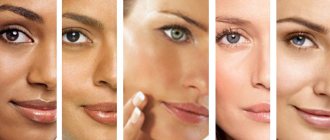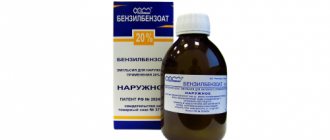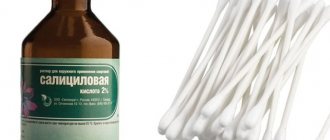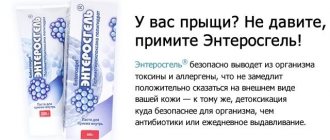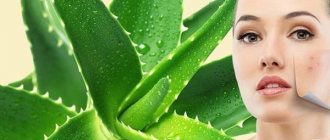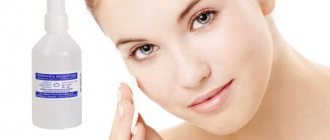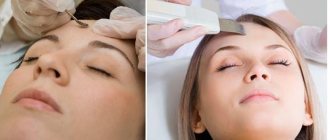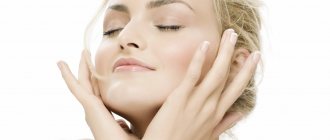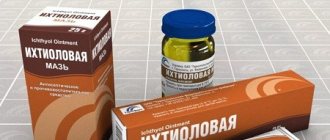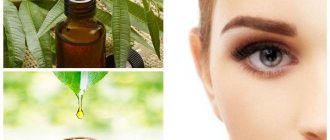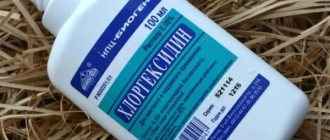Acne treatment is a long process, the effectiveness of which depends on the causes of acne, its stage of formation and the correct medication. Cosmetology offers many different methods to eliminate this phenomenon. These are mechanical, ultrasonic and laser facial cleansing. After their use, the skin is renewed by eliminating dead cells from its surface and cleansing the pores. But these procedures must be done several times, and each of them is expensive. Therefore, it is much more common to use products that are sold in pharmacies. Some of them can be used not only to treat existing rashes, but also to prevent their formation. One of these products is Miramistin, which deeply cleanses the skin and protects it from infections.
Does Miramistin help with acne?
For most people, acne begins to bother them at the onset of puberty. At this time, the body begins to actively produce hormones, the amount of androgens increases, due to which the work of the sebaceous glands is activated. Sebum begins to be produced in excess, which closes the ducts and, together with dirt particles and dust fragments, creates a favorable area for the proliferation of pathogenic microorganisms. This process leads to the appearance of rashes and purulent pimples on the face.
The appearance of acne on the face at a later age is most often caused by weakened immunity, malfunction of the thyroid gland, and diseases of the stomach and intestines. Skin problems also appear due to addiction to bad habits (drinking alcohol, smoking), addiction to junk food, stress, frequent overwork, and insufficient care of the skin on the face.
Miramistin is a mild medicine that helps quickly get rid of blackheads. The drug will destroy pathogenic microorganisms that cause inflammatory processes. Miramistin is safe and can be used without a dermatologist's prescription.
Attention! Pathogenic microorganisms cannot develop resistance to the drug. That is why Miramistin is very effective in the fight against acne on the face.
Description and composition
Miramistin reaches pharmacy counters in 2 forms: solution, spray, and ointment. Designed for local treatment of affected skin areas.
The main active ingredient is benzyldimethyl ammonium chloride. It has the ability to penetrate the cell membranes of pathogenic microorganisms, which inhibits their action. An additional component in the composition is water, purified in accordance with pharmacological production standards.
Miramistin is available in plastic bottles. Bottled in volumes from 50 to 200 ml. The kit includes a nozzle for fine spraying of liquid. Less commonly used is an ointment based on the active ingredient. Packaged in aluminum tubes of 15 or 30 g.
Main indications for the use of Miramistin:
- Inhibition of viral activity;
- Activation of local immunity;
- Stimulating tissue regeneration;
- Reduced inflammation;
- Fight against pathogenic microflora.
The healing properties of Miramistin against acne
Miramistin is a domestically produced medicine; it was originally created for astronauts who needed a broad-spectrum antiseptic. The medicine appeared on the market 20 years ago, but to this day it is considered one of the most versatile and effective. Almost all residents of Russia have Miramistin in their medicine cabinet. This prevalence can be easily explained: the medication has a wide range of uses.
The medicine is used in dentistry, gynecology, dermatology, urology, surgery, traumatology, for the treatment of throat diseases and relief of inflammation in the oral cavity, for colds, for the treatment of instruments and surfaces. Not so long ago they began to use it in cosmetology.
Benefits of using Miramistin:
- with regular use, Miramistin stabilizes the functioning of the sebaceous glands and reduces sebum production;
- kills pathogenic microorganisms, prevents their reproduction, which completely eliminates harmful microorganisms, thereby preventing the formation of new acne on the face;
- Miramistin clears clogged ducts from sebaceous plugs, reduces the number of blackheads, and reduces foci of inflammation;
- does not dry out the dermis and forms a protective layer on it from unfavorable external irritants;
- Miramistin can be safely used on skin prone to allergic reactions due to the mild effect of the drug;
- removes redness and swelling;
- has a pronounced antimycotic effect - eliminates yeast fungi, is used as a treatment for various mycoses and candidiasis;
- improves the regeneration of epidermal cells.
Miramistin removes acne on the face, does not cause habituation, and can be used for a long time. The drug is non-toxic, the likelihood of side effects is minimal. The medicine is generally available - you can easily buy it in any pharmacy at a reasonable cost. Miramistin is available without a prescription.
Application area
Miramistin actively fights most gram-positive and gram-negative bacteria, including hospital bacteria. The drug destroys yeast and yeast-like fungi and dermatophytes, viruses (including sexually transmitted ones). Thanks to these properties, it is effective in surgery, dermatology and venereology, dentistry, otolaryngology, urology and gynecological practice. Find out what Akriderm cream helps with here.
Indications
Indications for use in cosmetology are the following pathologies:
- acne (acne);
- prevention of inflammation after cosmetic procedures;
- traumatic skin injuries;
- acne, suppuration;
- microbial infections;
- enlarged clogged pores;
- excessively active production of sebum;
- candidomycosis;
- herpes;
- burn injuries.
Thus, it is possible to use Miramistin directly to treat skin problems on the face and body, provided the dosages are observed.
Contraindications
Sprays and solutions should not be used by persons who are hypersensitive to the composition of the drug. In addition, these drugs are prohibited for use in children under three years of age.
The ointment should also not be used if there is a high probability of allergies. In this form, the drug is prohibited for children under one year of age. There is no data on use during pregnancy and breastfeeding, however, in this case, treating the skin with Miramistin is allowed. You can learn about the effect of Metrogyl gel against acne in this material.
Is it possible to wipe your face against acne with Miramistin?
Miramistin helps fight acne on the face. It perfectly helps get rid of existing rashes and is suitable for use as a preventive measure. The medicine can be used as a lotion every day.
How to wipe your face with Miramistin for acne:
- First you need to cleanse your skin of cosmetics and impurities.
- A cotton pad is moistened in Miramistin.
- Foci of inflammation are wiped with circular movements.
It is recommended to wipe your face with the product several times a day. If the epidermis on the face is dry and sensitive, then once is enough.
How to use Miramistin correctly for acne
There are a few simple rules to follow for more effective treatment of acne on the face:
- Wipe your face with Miramistin several times a day instead of water.
- Apply the spray to pimples several times a day.
- For extensive foci of inflammation, compresses must be applied. To do this, apply a cotton swab soaked in the solution for 15 minutes.
Advice! It is best to use the drug immediately before going to bed, because at night the regeneration of the skin on the face accelerates.
Ointment
The ointment is recommended for use on large areas of acne. It can be applied in a thin layer to the entire surface of the face or treated with acne using a cotton pad. If there is an abundance of purulent pimples, apply a bandage to the skin: gauze is smeared with Miramistin and fixed to the lesions. After 4 hours, the bandage needs to be changed.
Solution
Miramistin solution is more suitable for preventing acne or when it is not possible to provide proper facial care - for example, during travel or long hikes.
Attention! During application, you should try to avoid getting Miramistin into the eyes and mucous membranes - irritation may occur. It is undesirable for it to enter the oral cavity, although in most cases it will not lead to adverse consequences.
You can use Miramistin from 1 time a day for facial disinfection and preventive measures to 5 times a day to eliminate existing acne. Regular use depends on the current state of the dermis and the frequency of rashes. It is best if a dermatologist determines the frequency of use of the drug.
Spray
The spray has a more pronounced effect in the treatment of acne, because the concentration of active substances in the spray is 0.5%, and in the solution - 0.01%. It is also suitable for daily use. The spray is applied to a cotton pad and wiped over the entire surface of the face except for the area around the eyes. The spray will improve skin tone, relieve redness and remove inflammation and blackheads on the face.
To quickly get clear skin on your face without inflammation, you should listen to the following recommendations from doctors:
- Eat properly. It is worth excluding the consumption of fatty and fried foods, dairy products, sweets and flour products, and carbonated drinks. Include more fresh fruits and vegetables, cereals, nuts, and dairy products in your diet.
- Drink enough water. To cleanse the body and remove all toxins, you need to drink at least 2 liters of water a day.
- Don't forget about regular skin cleansing. You should take a shower or bath at least once a day. It is also important to wash after physical activity.
It is important to regularly walk in the fresh air, play sports, avoid stress if possible, and refrain from bad habits.
Precautionary measures
According to reviews from some people who have used Miramistin on the face for acne, a burning sensation is felt when applying the drug to damaged skin. Most characterize it as mild, quickly passing as Miramistin dries. Do not worry if such sensations appear; this does not mean that the product is harmful to the skin; the drug should not be discontinued. You need to worry if the burning sensation persists for more than 20 minutes, but the intensity does not decrease, the skin of the face turns red, or a rash appears. These are symptoms of an allergy to Miramistin, then you should not use it.
No cases of drug overdose have been found during the entire existence of Miramistin. Since the drug has an effect only on the skin and does not penetrate into the blood, we can conclude that an overdose of the drug is impossible. There were also no negative drug interactions identified. On the contrary, Miramistin increases the effectiveness of antiseptics, and in the complex treatment of acne on the face it turns out to be quite effective.
The only thing you need to be careful about is that Miramistin should not come into contact with the mucous membranes of the eyes - this can cause allergic reactions. If the medicine accidentally gets on the mucous membrane, a burning sensation and a feeling of freezing may occur. Then the drug must be washed off as soon as possible, rinse your eyes or mouth with liquid.
Acne treatment
Acne treatment must be comprehensive and begin with a trip to the doctor, who will conduct a diagnosis, determine the severity of the disease and develop a treatment plan.
It is very important to find out the causes of acne and eliminate them. And only then use external methods of influence.
- In complex cases, systemic treatment with antibiotics, the use of retinoids or hormonal contraceptives is required.
Contraindications
Miramistin is an absolutely safe drug for eliminating acne on the face; it can be used by all people, with any skin type. Almost no side effects were noticed after its use, with the exception of isolated cases of allergies. The fact is that the product contains only miramistin and plain water; hypersensitivity to this component occurs very rarely.
Many nursing and pregnant women are interested in whether they can apply Miramistin to their face for acne. It is possible because the medicine is not absorbed into the systemic circulation, so there is no risk of harming the child. Pregnant women need to be more careful; they should carefully ensure that the medicine does not get on the mucous membranes.
Recommendations
It should be borne in mind that when a solution or ointment is applied topically, itching and burning may occur. The unpleasant sensations quickly pass. Propylene glycol in ointments sometimes causes redness, itching, nettle rash, and increases dry skin. You need to wash off the product and apply Fenistil gel to the skin or take antihistamine drops (tablets).
It is also necessary to remember that the substance Miramistin interacts with corticosteroids in ointments and creams used to treat rashes of various origins. With simultaneous use, the effectiveness of treatment decreases.
